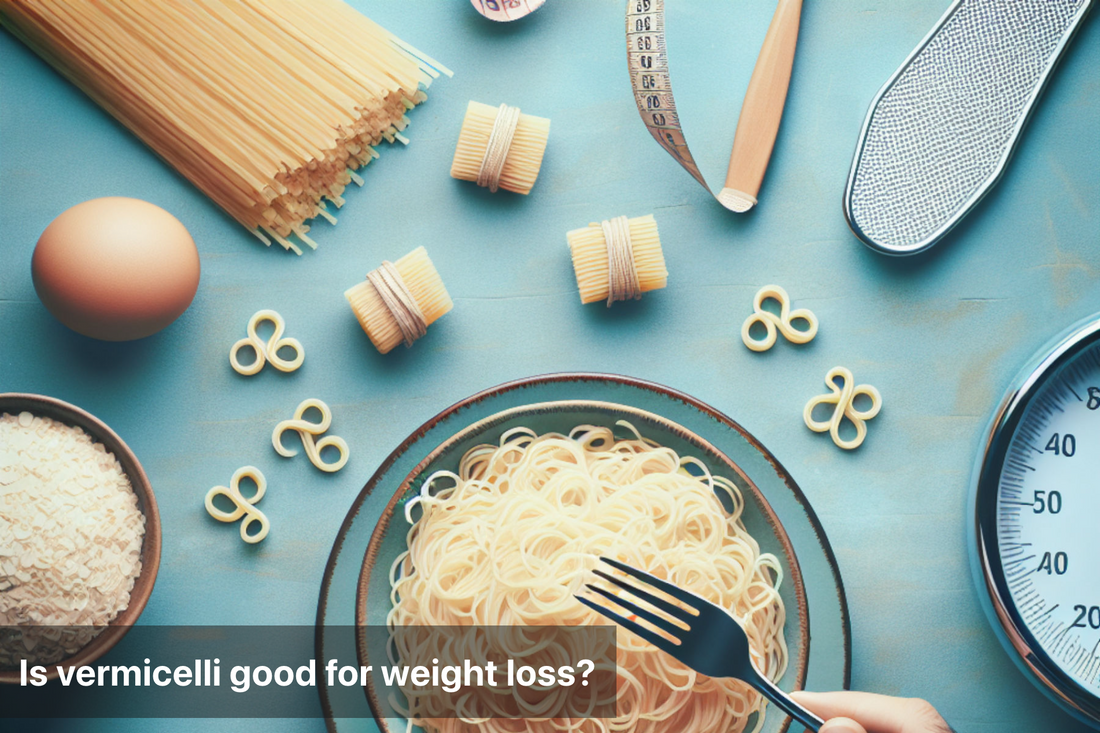
Is vermicelli good for weight loss?
Share
Vermicelli is a type of pasta that's notably thinner than traditional spaghetti. Originating from Italy, its name translates to "little worms" in Italian, a reference to its delicate shape. Over time, this versatile ingredient has made its way into multiple cuisines, becoming a staple in Asian, Middle Eastern, and Mediterranean dishes. In countries like India and Thailand, vermicelli is often used in both savory and sweet preparations, ranging from stir-fries to desserts.
The primary ingredients in vermicelli are semolina or rice flour. These contribute to its texture and flavor but also shape its nutritional profile. Generally, it is low in fat and provides a source of carbohydrates, making it a quick energy provider. However, it is important to consider portion sizes, especially for those monitoring their weight.
Incorporating it with plenty of vegetables or lean proteins can enhance its nutritional benefits. Balancing vermicelli with other food groups ensures that it can fit into a healthy diet, supporting overall wellness—so it's essential to think creatively when adding it to meals.

Nutritional Value of Vermicelli
Below is the nutrition table for 100 grams of cooked vermicelli (plain, unseasoned):
Nutrient |
Amount |
|---|---|
Energy (Calories) |
150 kcal |
Carbohydrates |
30 g |
Protein |
5 g |
Fat |
0.8 g |
Fiber |
1.4 g |
Sugars |
0 g |
Sodium |
1 mg |
Potassium |
44 mg |
Calcium |
10 mg |
Iron |
1.2 mg |
How Vermicelli Affects Weight Management
Low in Fat: Vermicelli is low in fat, making it suitable for controlling overall fat intake in a weight management plan.
Moderate in Calories: At 150 calories per 100 grams, vermicelli is relatively low-calorie, allowing for portion control in meals.
High in Carbohydrates: As a carb-rich food, excessive consumption can lead to weight gain if not balanced with other food groups.
Contains Protein: It provides a small amount of protein, which helps with muscle maintenance and promotes satiety.
Low in Fiber: Due to its low fiber content, it may not be as filling, so pairing it with vegetables and protein is essential for keeping hunger at bay.
"Balance is key to healthy living—vermicelli can be part of a balanced diet, fueling your body without overloading it." recommends Health Coach Madhavi Mahajan (PG in Sports Science, Fitness & Nutrition)
Healthy Ways to Incorporate Vermicelli into Your Diet
Incorporating vermicelli into a weight-loss regimen can be both nutritious and delicious. Here are some practical tips and recipes to consider.
Method |
Description |
|---|---|
Add to Vegetable Stir-fries |
Mix vermicelli with a variety of colorful vegetables for a nutrient-packed meal. |
Use Whole Grain Vermicelli |
Opt for whole wheat or brown rice vermicelli for added fiber and nutrients. |
Pair with Lean Protein |
Combine with lean proteins like chicken, tofu, or legumes to boost satiety. |
Use in Soups |
Add vermicelli to vegetable or chicken soups for a light, filling dish. |
Top with Fresh Herbs |
Garnish vermicelli dishes with fresh herbs like cilantro or parsley for added flavor and nutrients. |

Considerations to Keep in Mind
High Carbohydrate Content: Excessive consumption of carbs can contribute to weight gain if not balanced with other foods.
Low Fiber: Vermicelli is not a rich source of fiber, which means it may not be very filling on its own.
Not Very Nutrient-Dense: While it provides some micronutrients, vermicelli is not a powerhouse of vitamins and minerals.
Summary
In summary, vermicelli can play a role in weight management when incorporated thoughtfully into your diet. The question "is vermicelli good for weight loss" elicits varied responses depending on individual dietary needs and goals. Its relatively low-calorie content offers the opportunity to enjoy a satisfying meal while managing portion sizes.
Moderation is key. When you include vermicelli in your meals, balance it with fiber-rich vegetables, lean proteins, and healthy fats. This approach not only enhances the nutritional value of your dish but also promotes satiety and satisfaction.
Maintaining a healthy relationship with food is crucial. Rather than viewing vermicelli solely as a weight-loss hurdle, think of it as a versatile ingredient that can fit into a diverse array of meals. Ultimately, a well-rounded diet combined with regular physical activity is the foundation for effective weight management. If you enjoy vermicelli, allow yourself to savor it in moderation, and it can certainly be part of your journey towards a healthier lifestyle.
FAQs
-
Is vermicelli good for weight loss?
Yes, vermicelli can be part of a weight loss diet if consumed in moderation and paired with nutrient-dense foods.
-
How many calories are in vermicelli?
A 100-gram serving of cooked vermicelli contains approximately 150 calories.
-
Can I eat vermicelli on a low-carb diet?
Vermicelli is high in carbohydrates, so it may not be suitable for strict low-carb diets. However, it can be enjoyed in moderation as part of a balanced diet.
-
How can I make vermicelli healthier?
Add vegetables, lean proteins, and use whole grain or brown rice vermicelli for added fiber and nutrients.
-
Is vermicelli a good source of protein?
Vermicelli provides a small amount of protein, but it is not a significant source. Pairing it with protein-rich foods will enhance its nutritional value.
